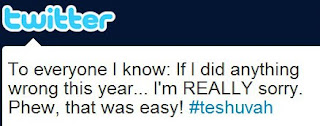Offering Repentance with Facebook and Twitter
Is it acceptable to tweet teshuvah (repentance) or offer a mea culpa on Facebook? A few Yom Kippur holidays ago, I delivered a sermon explaining how Jewish people have begun “doing teshuvah” — seeking repentance from others — through social networking sites like Facebook and Twitter. A week before Yom Kippur the religion editor of The Detroit Free Press, Niraj Warikoo, called to find out what I’d be speaking about on the Day of Atonement. My topic interested him and he wrote a cover story about how some people spend the week before the holiday asking acquaintances for forgiveness for perceived wrongdoings by offering blanket apologies in their Facebook status updates and tweets.
Several newspapers, blogs, and the AP picked up the story from the Free Press. Warren Riddle on Switched, AOL’s tech blog, wrote, “At least one member of the Jewish clergy, Rabbi Jason Miller of Michigan, is asserting that the rise of social networking is diminishing the significance of repentance. He believes that people are using sites like Facebook and Twitter to issue mass, unspecific apologies in order to eliminate uncomfortable, individual personal interaction. Miller said that, in order to protect the true meaning of Yom Kippur, ‘There should be an effort, a little challenge to go up to another person and seek forgiveness, to admit our wrongdoing.’ Incorporating technology into religious holidays and services is a hotly debated issue. Some groups welcome modern and creative ways of attracting new members, specifically young folks, while other religious leaders bemoan technological advances. Miller’s comments, though, should cross all denominations. Some sentiments and feelings are best and most effectively expressed in person — unless, of course, you’re comfortable with your failures being eternally stored for public judgment.”
Of course, I’m sure that when it became possible to send letters quickly through the postal service, there were rabbis who felt that it wasn’t appropriate to send requests for teshuvah through the mail. And when the telephone was invented, there must have been opposition to this impersonal way of seeking repentance. Just like several years ago when many questioned if it was appropriate to offer forgiveness in an email message. While face-to-face is undoubtedly the best way to seek true repentance from our friends and family, we must also face the reality that social networking and text messaging are how many of us communicate on a daily basis, and some will use those media to apologize before Yom Kippur.
My recommendation, however, is that if you are going to ask someone for teshuvah on Twitter of Facebook, at least make it a personal plea and send the message privately.
